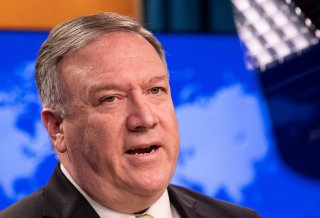Pompeo Lays Out the Case For Cold War II With China
‘The regime is ideologically and politically hostile to free nations.’
Secretary of State Mike Pompeo slammed China as “hostile to free nations,” portraying Beijing as fundamentally opposed to the United States, on Wednesday.
Tensions between the United States and China have reached a fever pitch during the coronavirus pandemic. Pompeo’s speech at a Wednesday morning press conference laid out a vision of a global clash between two fundamentally different societies.
“China’s been ruled by a brutal, authoritarian regime, a communist regime since 1949,” he said. “We greatly underestimated the degree to which Beijing is ideologically and politically hostile to free nations. The whole world is waking up to that fact.”
He added that a focus on the coronavirus pandemic “risks missing the bigger picture of the challenge that’s presented by the Chinese Communist Party.”
The pandemic has accelerated U.S.-China tensions.
Last week, a Chinese Communist Party news threatened sanctions against U.S. lawmakers for attempting to sue the Chinese government for the pandemic, and U.S. law enforcement accused Chinese hackers of cyberattacks against U.S. researchers.
But the Secretary of State pointed to deeper issues in the relationship, claiming that “the nature of the regime is not new.”
“For several decades, we thought the regime would become more like us through trade, scientific exchanges, diplomatic outreach, letting them in the [World Trade Organization] as a developing nation,” he said. “That didn’t happen.”
Pompeo accused the World Health Organization’s director-general Dr. Tedros Adhanom Ghebreyesus of “unusually close ties to Beijing” that “started long before this current pandemic.”
The Trump administration has accused China of covering up information about the novel coronavirus—even implying that the virus emerged from a lab accident in Wuhan, China—and pointed the finger at the World Health Organization for aiding China’s coverup.
The Secretary of State slammed the public health group for excluding Taiwan in his Wednesday speech, touching on a sensitive topic for Beijing.
Taiwan, an island that was once ruled by China, has ruled itself since the end of the Chinese Civil War in 1950. Beijing considers the island a breakaway Chinese province that must be reunited with the mainland, while Taiwan’s ruling Pan-Green Alliance leans towards independence.
“The democratic process in Taiwan has matured into a model for the world,” Pompeo said, congratulating President Tsai Ing-wen on her re-election. “Despite great pressure from the outside, Taiwan has demonstrated the wisdom of giving people a voice and a choice.”
But he shied away from changing U..S. policy towards Taiwan..
Pompeo said that work that “comports with the history of the agreements between the United States and China is the right solution to maximize the stability there in the straits.”
The United States acknowledged the Chinese position that “there is but one China and Taiwan is part of China” as part of a 1979 joint communique with Beijing, and does not officially recognize Taiwan as a state, but maintains close informal ties with the Taiwanese government and opposes attempts to change the island’s government by force.
“The President talked about how we’re going to respond [to China], how he’s beginning to think about responding to the calamity that has befallen the world as a result of the actions of the Chinese Communist Party,” Pompeo said. “I don’t want to get ahead of him in terms of talking about how the administration will respond to that, but you can already begin to see the outlines of it.”
Matthew Petti is a national security reporter at the National Interest. Follow him on Twitter: @matthew_petti.
This article initially stated that the United States “recognized that ‘there is but one China and Taiwan is a part of China’ in a 1979 joint communique.” The communique actually states that the United States “acknowledges” this as the Chinese position. The article has been updated to more correctly reflect the communique.
Image: Reuters.

